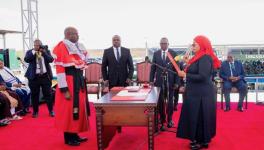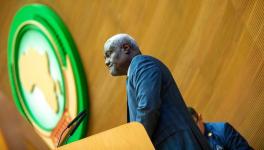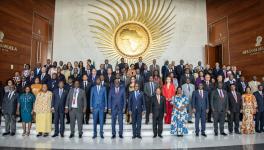At 20, African Union Has Achieved Much But The Work Goes On
African Union Chairman Macky Sall addresses members
The African Union marks its 20th anniversary on Saturday.
In the two decades since it was officially founded, the organization has accomplished much, especially when it comes to amplifying Africa's voice on the global stage and breaking down the continent's trade barriers.
But, critics say, the African Union needs to better deal with the conflicts and undemocratic changes of government that are threatening the continent's prosperity, as well as to find a unified voice to tackle climate change.
Common voice
When the African Union was launched in 2002 as a successor to the Organisation of African Unity (OAU), its founders pledged a shift to a more realistic and pragmatic stance on political cooperation.
"Time has come that Africa must take her rightful place in global affairs," the first AU chairperson, Thabo Mbeki, declared at his inauguration speech in Durban, South Africa.
Analysts agree that this has often been achieved — with the bloc's 55 member states managing to engage collectively on many global issues, giving Africa a greater say in the international arena.
"The AU has helped African countries become more active and assertive in the decision-making process around the world," Thomas Kwasi Tieku, an international relations expert at the University of Western Ontario in Canada, told DW.
Ghana's Ambassador to Belgium and Luxembourg, Harriet Sena Siaw-Boateng, has a similar opinion.
"African countries are following Europe's lead at becoming more successful at drafting, negotiating and presenting common positions to advance and defend our own interests," Siaw-Boateng said at a public webinar about the AU hosted by the Institute for Security Studies, a South Africa-based think tank.
When Africa acts as one, Siaw-Boateng said, "the world sits up and takes notice."
Most recently the African Union has received praise for its role in coordinating the continent's pandemic response and lobbying for vaccine access and COVID-19 debt relief.
The African Union has been mostly praised for its united COVID-19 response
Not united enough
At the same time, several analysts are critical of the AU's failure to develop a common position on climate change, given Africa's increasing vulnerability to global warming.
The bloc has also been unable to find a unified stance on Russia's influence in Africa and the invasion of Ukraine.
"We need to stop being selfish," Siaw-Boateng said. Africa needs to discuss its place in the world and project its interests outwards, she added.
Opening up for business
The AU is loosely based on the European Union model, and like the EU, one of its founding pillars is economic integration.
The start of the African free trade agreement, or AfCFTA, on January 1, 2021 saw the AU inject new dynamism into this objective.
AfCFTA, which aims to create a single market for goods and services, is expected to boost intra-Africa trade by about $35 billion (€34.4 billion) and also make it easier to attract large-scale infrastructure investment because of the bigger size of the market.
Africa's free trade agreement makes the continent the world's largest free trade area
The African Union is coordinating the agreement's negotiations and implementation.
Germany's agency for international cooperation, GIZ, sees AfCFTA as a "huge diplomatic and political success given the short timeline, the ambitious liberalization goals set, and the heterogeneity and large number of 55 member states negotiating the Free Trade Area."
'Nonindifference'
The AU has also managed to deepen its peace and security cooperation with the United Nations over the past two decades.
Before the AU was founded, and in the early years of its existence, the United Nations was the main security actor on the continent and the main provider of peacekeeping forces.
This was largely because the AU's predecessor, the OAU, lacked the legal means to become involved in domestic conflicts.
The African Union, however, took a different approach. Embracing the principle of "nonindifference," it has a mandate to intervene in a member state in the face of war crimes, genocide and crimes against humanity.
The African Union has since developed significant peacekeeping operations, both working together with UN forces in places such as Mali and the Democratic Republic of the Congo, as well as deploying operations of its own in countries like Burundi and Sudan and currently in Somalia.
These Ethiopian soldiers are part of the African Union's peacekeeping mission in Somalia
The lack of coordination between the organizations' main political organs — the UN Security Council and AU Peace and Security Council — during major crises "signal an uncomfortable future for inter-council cooperation," finds a 2019 analysis of AU-UN cooperation by the independent International Crisis Group.
Promoting democracy
The African Union has also had a "positive influence" within the continent, Tieku said.
It has done this by spreading liberal values of democracy, including free elections, transparency and anti-coup norms, he added.
"Prior to the formation of the AU, the word democracy was very controversial, very contested, and a number of African elites associated it with colonialism and the colonial legacy," he said.
Tieku said the AU could also be credited with boosting the perception that coups are an illegitimate means of acquiring power in Africa.
Most recently, the African Union suspended the membership of Mali, Burkina Faso, Guinea and Sudan after military coups.
Coup leaders in all of these countries, however, have ignored the African Union's calls for a return to democratic government.
Transitional President, Assimi Goita (right), says Mali will return to civilian rule in March 2024
Entrenched power
The African Union takes a different stance when it comes to leaders overstaying their terms or amending the constitution to let them stay in power.
In these cases, the AU has been "much softer," said Alex Vines, who leads the Africa Programme at the London-based think tank Chatham House.
For example, the African Union had no rebuke for the power grab of Guinean President Alpha Conde when he stood for a controversial third term in 2020 after constitutional changes. Less than a year later, Conde was deposed in a military coup supported by cheering Guineans.
The African Union has been strongly criticized for its reticence in these cases.
In an article for Foreign Policy magazine, Adem K. Abebe, from the Sweden-based International Institute for Democracy and Electoral Assistance, blasted the African Union for failing to denounce changes to term changes.
"This double standard, hypocrisy, and inconsistency have exposed the AU as a 'Club of Incumbents' protecting their own grip on power," he said, "while undermining the AU's moral standing to reject popularly supported coups."
Correction: This article was revised on July 13 to include a link to the ICC public webinar where AU Ambassador Frederic Ngoga commented on the AU.
Get the latest reports & analysis with people's perspective on Protests, movements & deep analytical videos, discussions of the current affairs in your Telegram app. Subscribe to NewsClick's Telegram channel & get Real-Time updates on stories, as they get published on our website.




























